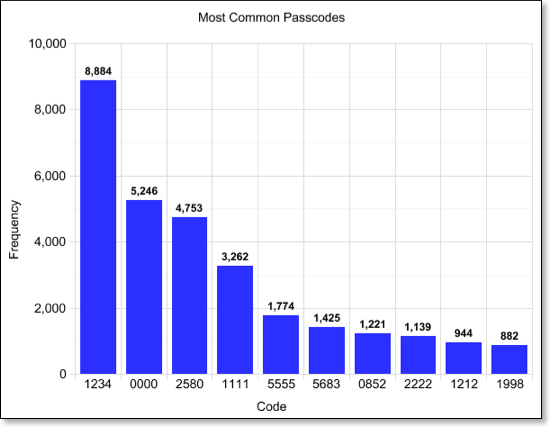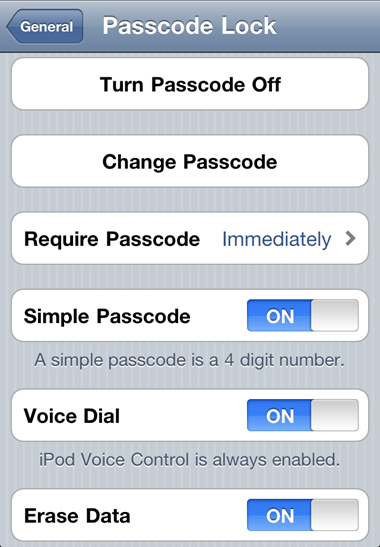Daniel Amitay has developed an iPhone security App known as Big Brother Camera Security, which relies on the simple concept of capturing a picture of anyone who enters the wrong passcode when unlocking the device. Weirdly enough, the app also tracks passcodes (on an anonymous basis of course) for statistical purposes, which led Amitay to write a rather amusing blog post with the top 10 most used passcodes. And yes, the most used one is 1234, how did you guess?
As you can tell from the graphic above, the two most common passcodes are 1234, followed by 0000, at least out of all Camera Security users. Security Savvy users should definitely know better, since the first codes any th*ef will likely try will be exactly those two, and therefore defeat the point of the Camera Security app altogether. Another popular pattern seems to be dates, such as 1998 and 1989, which are likely associated with birth and graduation dates, which is another big no-no if the th*ef happens to know a little about you (or takes the time to take a look at any ID you might have in your wallet). This also points to this app’s young user base, as its author concluded, which should definitely be more security-aware:
, any passcode between 1930 and 2020 has a much higher likelihood versus the average (represented by ****): at minimum a 50% gain, at maximum a 2570% gain. This data implies a heavy age range of 11 – 21 year olds.
15% of Camera Security users are using one of the codes listed above. If you’re using one of those, I’d recommend you change it quickly to something more unique: I tend to come up with two two-digit numbers that make sense to me and combine then – despite being fairly low-tech, that an effective and secure method.
This can appear rather shocking, but in fact it’s just a reflection of how little we really care about security. This applies to website passwords too, where 1234, birth dates and dictionary words are among the most popular. It’s a known fact that we only perceive threats when they’ve hit us in some way, it’s human nature. Until the time when we in fact do get hit and our personal data falls on the wrong hands.
Food for thought.
(For more tidbits, you can read Daniel’s full blog post here)
You can follow us on Twitter or join our Facebook fanpage to keep yourself updated on all the latest from Microsoft, Google and Apple.



